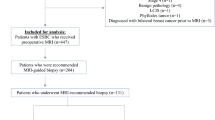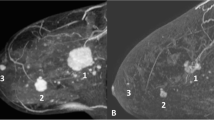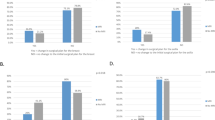Abstract
Objective
The objective of this study was to evaluate the clinical utility of breast MRI for patients with known in-breast tumor recurrence (IBTR). The aim was to determine if the addition of breast MRI altered surgical approach or multidisciplinary management.
Summary background data
Previous studies have focused on using breast MRI for surgical planning for index breast cancers (BC) or detecting IBTR. However, the clinical impact of obtaining MRI in the setting of known IBTR has not been evaluated.
Methods
A single-institution retrospective chart review was performed to compare surgical approach and multidisciplinary management for patients diagnosed with isolated IBTR who did and did not undergo breast MRI following IBTR diagnosis.
Results
IBTR was identified in 69 patients, 46% of whom underwent MRI. There was no difference in the operative approach (p = 0.14) for IBTR patients who did and did not undergo breast MRI Additionally, there was no difference in multidisciplinary care, treatment order, metastatic disease identification, or mortality between cohorts. A relatively small subgroup of patients (n = 3) required change in surgical plan based on MRI results. Patients proceeding with surgery first who also underwent breast MRI experienced a significantly longer time to surgical intervention (p = 0.03).
Conclusion
Breast MRI following IBTR diagnosis infrequently impacted clinical management, including surgical approach and multidisciplinary care. MRI for local disease assessment at the time of IBTR should be used selectively based on clinical concern.
Similar content being viewed by others
Data Availability
All data generated or analyzed during this study are included in this published article.
Abbreviations
- BMI:
-
Body Mass Index
- BC:
-
Breast Cancer
- BCT:
-
Breast-Conserving Therapy
- IBTR:
-
In-Breast Tumor Recurrence
- IRB:
-
Institutional Review Board
- NCCN:
-
National Comprehensive Cancer Network
- PRS:
-
Plastic Surgery
References
Agarwal S, Pappas L, Neumayer L, Kokeny K, Agarwal J (2014) Effect of breast conservation therapy vs mastectomy on disease-specific survival for early-stage breast cancer. JAMA Surg 149(3):267–274
Kunkler IH, Williams LJ, Jack WJ, Cameron DA, Dixon JM. Breast-conserving surgery with or without irradiation in women aged 65 years or older with early breast cancer (PRIME II): a randomised controlled trial. (1474–5488 (Electronic)).
Fisher B, Anderson S, Bryant J et al (2002) Twenty-year follow-up of a randomized trial comparing total mastectomy, lumpectomy, and lumpectomy plus irradiation for the treatment of invasive breast cancer. N Engl J Med 347(16):1233–1241
Bosma SCJ, van der Leij F, van Werkhoven E et al (2016) Very low local recurrence rates after breast-conserving therapy: analysis of 8485 patients treated over a 28-year period. Breast Cancer Res Treat 156(2):391–400
Komoike Y, Akiyama F, Iino Y et al (2006) Ipsilateral breast tumor recurrence (IBTR) after breast-conserving treatment for early breast cancer: risk factors and impact on distant metastases. Cancer 106(1):35–41
Ishitobi M, Ohsumi S, Inaji H et al (2012) Ipsilateral breast tumor recurrence (IBTR) in patients with operable breast cancer who undergo breast-conserving treatment after receiving neoadjuvant chemotherapy: risk factors of IBTR and validation of the MD Anderson Prognostic Index. Cancer 118(18):4385–4393
Su Y, Guo R, Xue J et al (2019) Increased mortality with repeat lumpectomy alone after ipsilateral breast tumor recurrence. Oncologist 24(9):e818–e827
Wu Y, Shi X, Li J, Wu G (2021) Prognosis of surgical treatment after ipsilateral breast tumor recurrence. J Surg Res 258:23–37
Abner AL, Recht A, Eberlein T et al (1993) Prognosis following salvage mastectomy for recurrence in the breast after conservative surgery and radiation therapy for early-stage breast cancer. J Clin Oncol 11(1):44–48
Wapnir IL, Khan A (2019) Current strategies for the management of locoregional breast cancer recurrence. Oncology (Williston Park) 33(1):19–25
Veronesi U, Cascinelli N, Mariani L et al (2002) Twenty-year follow-up of a randomized study comparing breast-conserving surgery with radical mastectomy for early breast cancer. N Engl J Med 347(16):1227–1232
Yang SH, Yang KH, Li YP et al (2008) Breast conservation therapy for stage I or stage II breast cancer: a meta-analysis of randomized controlled trials. Ann Oncol 19(6):1039–1044
Chapman MC, Hayward JH, Woodard GA, Joe BN, Lee AY (2020) The Role of Breast MRI in detecting asymptomatic recurrence after therapeutic mastectomy. AJR Am J Roentgenol 215(1):254–261
Morrow M, Waters J, Morris E (2011) MRI for breast cancer screening, diagnosis, and treatment. Lancet 378(9805):1804–1811
Lee CS, Monticciolo DL, Moy L (2020) Screening guidelines update for average-risk and high-risk women. AJR Am J Roentgenol 214(2):316–323
Monticciolo DL, Newell MS, Moy L, Niell B, Monsees B, Sickles EA (2018) Breast cancer screening in women at higher-than-average risk: recommendations from the ACR. J Am Coll Radiol 15(3):408–414
Miller BT, Abbott AM, Tuttle TM (2012) The influence of pre-operative MRI on breast cancer treatment. Ann Surg Oncol 19(2):536–540
Plana MN, Carreira C, Muriel A et al (2012) Magnetic resonance imaging in the pre-operative assessment of patients with primary breast cancer: systematic review of diagnostic accuracy and meta-analysis. Eur Radiol 22(1):26–38
Moloney BM, McAnena PF, Ryan ÉJ et al (2020) The impact of pre-operative breast magnetic resonance imaging on surgical management in symptomatic patients with invasive lobular carcinoma. Breast Cancer (Auckl) 14:1178223420948477
Parsyan A, Moldoveanu D, Balram B et al (2016) Influence of pre-operative magnetic resonance imaging on the surgical management of breast cancer patients. Am J Surg 211(6):1089–1094
Amin AL, Sack S, Larson KE et al (2021) Does the addition of breast MRI add value to the diagnostic workup of invasive lobular carcinoma? J Surg Res 257:144–152
Zeng Z, Amin A, Roy A et al (2020) Pre-operative magnetic resonance imaging use and oncologic outcomes in premenopausal breast cancer patients. NPJ Breast Cancer 6:49
Pilewskie M, Olcese C, Eaton A et al (2014) Perioperative breast MRI is not associated with lower locoregional recurrence rates in DCIS patients treated with or without radiation. Ann Surg Oncol 21(5):1552–1560
Mann RM, Cho N, Moy L (2019) Breast MRI: state of the art. Radiology 292(3):520–536
Oseledchyk A, Kaiser C, Nemes L et al (2014) Pre-operative MRI in patients with locoregional recurrent breast cancer: influence on treatment modalities. Acad Radiol 21(10):1276–1285
Engin A (2017) Obesity-associated breast cancer: analysis of risk factors. Adv Exp Med Biol 960:571–606
Fortner RT, Katzke V, Kühn T, Kaaks R (2016) Obesity and breast cancer. Recent Results Cancer Res 208:43–65
Lee K, Kruper L, Dieli-Conwright CM, Mortimer JE (2019) The impact of obesity on breast cancer diagnosis and treatment. Curr Oncol Rep 21(5):41
Picon-Ruiz M, Morata-Tarifa C, Valle-Goffin JJ, Friedman ER, Slingerland JM (2017) Obesity and adverse breast cancer risk and outcome: Mechanistic insights and strategies for intervention. CA Cancer J Clin 67(5):378–397
Lee CH, Dershaw DD, Kopans D et al (2010) Breast cancer screening with imaging: recommendations from the Society of Breast Imaging and the ACR on the use of mammography, breast MRI, breast ultrasound, and other technologies for the detection of clinically occult breast cancer. J Am Coll Radiol 7(1):18–27
Feig S (2011) Comparison of costs and benefits of breast cancer screening with mammography, ultrasonography, and MRI. Obstet Gynecol Clin North Am 38(1):179–196
Bleicher RJ, Ciocca RM, Egleston BL et al (2009) Association of routine pretreatment magnetic resonance imaging with time to surgery, mastectomy rate, and margin status. J Am Coll Surg 209(2):180–187
Zhang M, Sun S, Mesurolle B (2017) The Impact of Pre-Operative Breast MRI on Surgical Waiting Time. PLoS ONE 12(1):e0169756
Leithner D, Wengert GJ, Helbich TH et al (2018) Clinical role of breast MRI now and going forward. Clin Radiol 73(8):700–714
Walstra C, Schipper RJ, Poodt IGM et al (2019) Repeat breast-conserving therapy for ipsilateral breast cancer recurrence: A systematic review. Eur J Surg Oncol 45(8):1317–1327
Acknowledgements
The authors thank Holly R. Zink, MSA of the Department of Surgery, University of Kansas, Kansas City, KS, for providing medical writing and editorial support for this research.
Funding
There were No funds, Grants, or other support received for the preparation of this manuscript.
Author information
Authors and Affiliations
Contributions
AS participated in the study design, data analysis, interpretation, writing, and critical revision. AH and JW participated in the study design, interpretation of data and critical revision. AA, CB, and LK participated in the study design, interpretation of data, and critical revision. KL participated in the study design, data analysis, interpretation of data, writing and critical revision.
Corresponding author
Ethics declarations
Conflict of interest
No authors have any conflicts of interest to report.
Ethical approval
This work was approved by the University of Kansas Medical Center Institutional Review Board.
Consent to Participate
Not applicable.
Consent to Publish
Not applicable.
Additional information
Publisher's Note
Springer Nature remains neutral with regard to jurisdictional claims in published maps and institutional affiliations.
Rights and permissions
About this article
Cite this article
Sutherland, A., Huppe, A., Wagner, J.L. et al. The clinical impact of MRI on surgical planning for patients with in-breast tumor recurrence. Breast Cancer Res Treat 193, 515–522 (2022). https://doi.org/10.1007/s10549-022-06589-1
Received:
Accepted:
Published:
Issue Date:
DOI: https://doi.org/10.1007/s10549-022-06589-1




